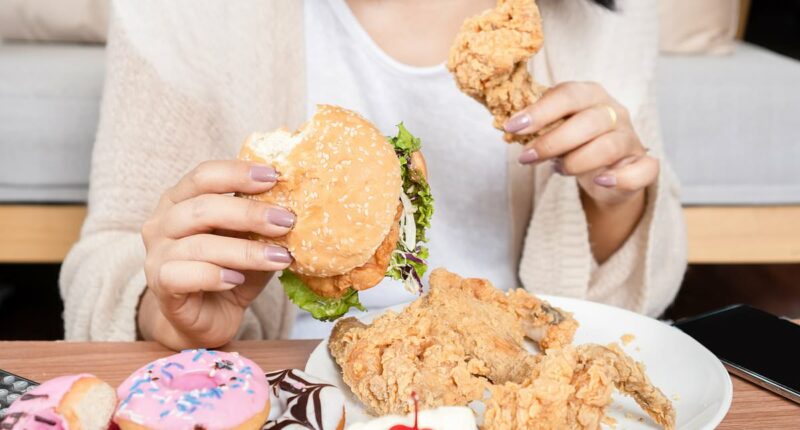Share this @internewscast.com
Recently diagnosed with type 2 diabetes, 62-year-old Joan has lost count of the number of diets she’s tried and failed to stick to.
With a background in nursing, she is well-aware of what a nutritious diet entails. Unfortunately, this only heightens her sense of shame and helplessness over her persistent weight issues.
Each morning, she approaches the day with resolve and starts with a healthy breakfast, she shares. However, by 11am, when hunger hits, she often opts for ‘just one biscuit’ with her coffee. More often than not, this leads to consuming eight and foregoing lunch as a form of compensation.
By teatime she has such strong cravings for pizza that she’ll end up getting one delivered, then following it with the rest of the biscuits.
Utterly dejected, she vows to do better the next day. But all too often, the demoralising pattern repeats.
I encountered Joan when she became part of one of the support groups I facilitate for Food Addiction Solutions, a charity aiding those dealing with compulsive eating and food addictions. Sadly, her story mirrors that of many others.
As a consultant psychologist with 35 years under my belt, assisting patients on issues ranging from eating disorders to chronic pain and cancer management, I’ve met numerous individuals like Joan.
Studies indicate that approximately one in seven adults (14 percent) experiences a lack of control over certain foods, exhibiting signs of food ‘addiction’ as assessed by the Yale Food Addiction Scale.

According to a review of studies involving nearly 16,000 individuals and published in the British Journal of Nutrition, 30 percent of those with type 2 diabetes exhibit tendencies of food addiction.

Dr Jen Unwin has been a consultant psychologist for 35 years and helped a wide range of patients with problems from eating disorders to chronic pain or dealing with cancer
This is a widely recognised questionnaire designed to identify whether a person’s desire for specific foods resembles that seen in substance addiction (e.g. to alcohol or drugs).
According to a review of research involving almost 16,000 participants and published in the British Journal of Nutrition, 30 per cent of people with type 2 diabetes have a food addiction.
This is why an increasing number of weight-loss and mental health experts such as myself are calling urgently for food addiction to be officially recognised as a serious condition, so that we can begin to help more people overcome what is often a lifelong struggle with weight that’s also damaging their health.
But there is good news, as I’ll explain – as another new study shows that with the correct help you can overcome food addiction.
It used to be assumed that people who couldn’t lose weight by dieting simply lacked willpower.
But scientists now increasingly recognise that large numbers of us – yes, doctors like me suffer from it too – genuinely battle to control our consumption of the junk foods that have crept into every corner of our daily lives, and that we’re struggling with a genuine addiction.
Often people who battle food cravings aren’t lacking in motivation in other areas of their lives – but when it comes to some foods, they find it impossible to silence the ‘food noise’ that tempts them to reach for another biscuit, bag of crisps or slice of cake. And it’s these foods that are at the heart of the problem.
It’s well known that such foods have been carefully designed to create a ‘bliss point’ of satisfaction that swamps the reward pathways in your brain, making them seem particularly delicious.

Scientists now increasingly recognise that large numbers of us genuinely battle to control our consumption of the junk foods that have crept into every corner of our daily lives, and that we’re struggling with a genuine addiction, writes Dr Jen Unwin
Yet a growing number of researchers and doctors like me believe that certain highly processed foods aren’t simply tempting but can even be addictive in the same way as nicotine and alcohol.
Although the terms food addiction and sugar addiction have been used interchangeably in the past, many experts now agree that it’s more accurate to describe this as an addiction to ultra-processed foods (UPFs) – those hyper-palatable products made using industrial processes and numerous chemical ingredients that you wouldn’t find in your kitchen at home.
Of course, the idea of any food being addictive is controversial – after all, we depend on it for our survival. Unsurprisingly, the food industry also contests this idea.
Yet, as the former head of the US’s food and drug safety watchdog, Dr David Kessler, recently pointed out: ‘Though it’s true food is required for survival – as it was thousands of years ago in hunter-gatherer culture – none of the ultra-formulated foods we eat today are found in nature.
‘These artificial products, contrived to be more desirable than anything we could experience naturally, have driven us not just to eat unhealthy food but to eat more of it than we need,’ he wrote in his book Diet, Drugs and Dopamine.
Dr Kessler, an eminent physician and an obesity expert, says that food addiction is now increasingly recognised among obesity experts and scientists following extensive research, including brain imaging.
He is one of a number of influential medics who’ve personally struggled with the problem, in his case feeling ‘impelled to eat without any sense of control’ despite knowing this was damaging his health.
Some experts are going further, calling on the wider medical profession to recognise the newer concept of pre-addiction – where people show signs of becoming addicted to food, but for whom it’s not yet a full-blown addiction.
The hope is that early intervention could help prevent more serious problems, just as a pre-diabetes diagnosis can help prevent full-blown diabetes.
Like Dr Kessler, for many years I, too, battled an addiction to processed foods. At its worst in my early 40s, even the tiniest taste of chocolate or cake would set off terrible cravings and I would keep eating it until I literally felt sick.
On one occasion I drove to the cinema just to get a huge tub of Ben & Jerry’s coated in chocolate sauce to eat by myself in the car.
Science is increasingly showing that such foods can ‘light up’ the reward centres of our brains in a way that natural whole foods do not.
For instance, a study in Germany published in the journal Cell Metabolism in 2018 used brain scanning to reveal that combinations of fat and carbohydrates commonly found in UPFs triggered a greater response in the reward centres of the human brain than either fat or carbohydrates alone.
Once I understood that my problem was addiction I knew I had to abstain from these foods entirely to get relief. I’m now 61 and have been free of UPFs, sugar and refined grains for ten years.
But in my experience, few nurses and doctors in diabetes clinics understand food addiction and the advice given – the EatWell plate, or eat less and exercise more – will be of little help to those with a genuine addiction to certain foods, for whom moderation is impossible.
And yet there is a way to successfully address this.
I was involved in research published this year in the journal Frontiers in Psychiatry which showed that, with the right advice and support, people can conquer their UPF addiction.
In the 12-month study the 238 participants (who screened positive for food addiction on the Yale Scale) were advised to eat a real food diet and to avoid sugar or processed food, particularly refined carbohydrates.
They were advised not to even keep these foods at home as well as on strategies to improve mood and deal with cravings and lapses.
After a year, 62 per cent of those completing the study no longer suffered from UPF addiction symptoms.
But people need help. Just like smoking, merely showing them the dangers and telling them to quit won’t be enough.
We need to train up healthcare professionals to recognise and treat food addiction and provide effective help to patients, as well as changing society’s views of these foods.
That’s why Food Addiction Solutions is calling on the World Health Organisation to urgently recognise UPF addiction so that more research and treatments can be funded. Ultra-processed food addiction has been hiding in plain sight and now is the time to do something about it.
Food Addiction Solutions is hosting the International Food Addiction and Co-morbidities conference on September 4-5. View it live at: the-chc.org/fas/conference











